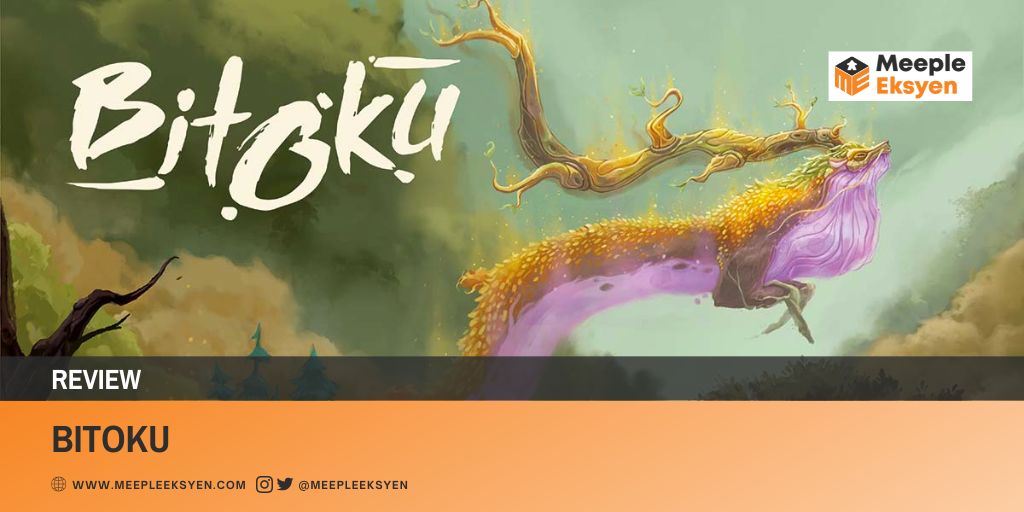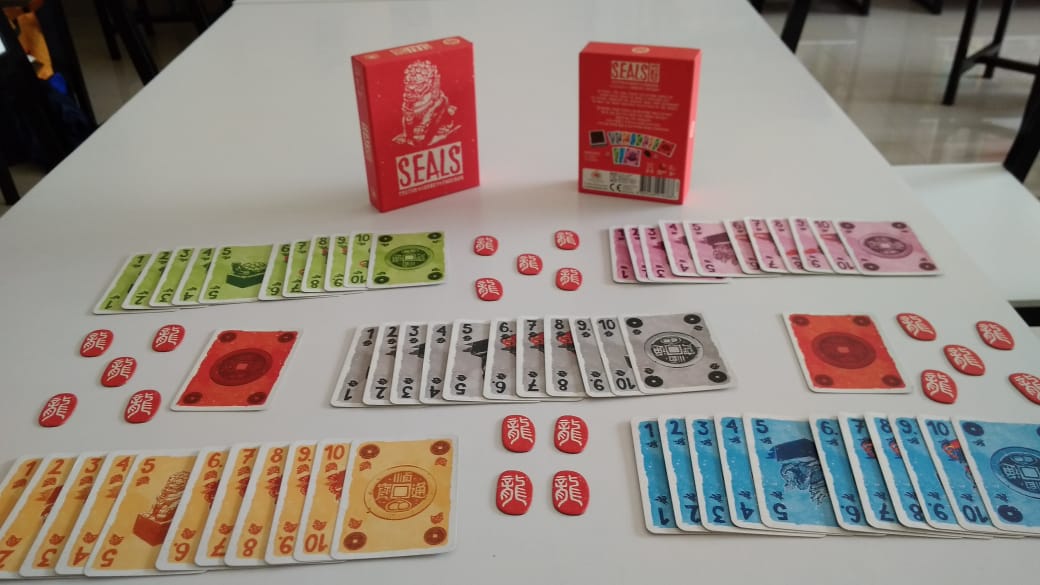I still remember my first encounter with Devir during SPIEL Essen 2018. To be honest, Bitoku is not my first game from this publisher — Ratzzia was it, actually. Both games involve dice within their mechanics, but they are different altogether. While Ratzzia can be categorized as a more lightweight game, Bitoku is rather more complex.
Frankly speaking, Bitoku has an extensive rulebook with a great deal of details in it. That would take long to even summarize them all in this article. Luckily, Devir themselves release a tutorial video on YouTube, which can be helpful to give some context to how the game works.
A short disclaimer before you read my board game analysis
As an avid euro gamer and hardcore Legend of the Five Rings (L5R) LCG player, my reviews may reflect a preference for these styles, and I may not cover solo games/variants extensively. Please note that my personal remarks are based on my gaming experiences, and I aim to provide honest insights within the scope of my preferences.
The beauty of this game has been radiating even before we unboxed it. I mean, look at the presentation from the box cover — it’s just a quick peek of some grandiose artworks that enfolds the enigmatic Bitoku universe. Sometimes, beauty comes intimidating enough, too. The captivating illustration is accompanied by more bits of components. Yes, there are lots of them inside the box, which can be quite scary for some first timers. More components mean more time for the setup, and that ends up to be true for Bitoku as well.
Talking about the board, I can understand why many new players find it confusing. Albeit standing elegantly and asserting table presence, it looks pretty busy. There are lots of flavour artworks, but I guess it needs more stern borders to point out where to put which components and such. Nevertheless, I am a sucker for beautiful components, so this does not bother me.
The whole concept is to play a Yōkai card, and by doing so, triggering the printed on it. This played card is then placed on a spot, which unlock a die there. It is pretty simple to understand, yet the rulebook format does not really support us to understand this concept easier. I guess, they need to have a redo on the format to make it lighter to comprehend.
Later on, that activated die becomes a worker which we place in a spot to trigger another action. Bitoku is registered in Board Game Geek with several mechanics implemented in it. For some reason, I quite disagree with their mechanical categorization for Bitoku. Hand management, for instance, is true only to some extent, but I wouldn’t dare to say that it feels so relevant in this game. Mainly because most of the Yōkai cards coming to my hands are not varied enough to manage.
Secondly, saying that Bitoku is an engine-building game is a bit inaccurate. The game lacks of tableau building mechanic to be one, in my opinion. It’s undeniable that I did advance on the paths for the pilgrim up there, and let’s not forget about the Bitoku paths taking place under my player board. Those actions bring advantages to reap swiftly after resolving them. But is it solid enough to be the engine? Or perhaps, they refer it to the Crystal tiles placed on the player board along the game — and by doing it, getting more resources per turn. Nevertheless, they build neither the so-called engine to increase the efficiency/quality of an action, nor provide/unlock new actions afterwards.
Bitoku is still a great game, despite being neither an engine-building game nor a game with a relevant hand management mechanic. What is Bitoku actually, then?
Well, with diverse ways to earn points, this game is indeed a point-salad game. There are multiple ways and various resources to earn points. At first, it can be overwhelming for first timers with the abundant options. They tend to experience analysis paralysis, but over the time, Bitoku will become a breeze.
The set-collection mechanic piles up in several aspects of the game, something commonly found in such a point-salad game. The Vision cards determine what kind of set players need to collect, and at the end of the game, scoring them when fulfilled, or deducting points when not. For example, players may need to collect some Crystal tiles and connecting numerous Dragonfly and Mitama tiles. It makes Bitoku more tactical rather than strategy, as it is quite hard to figure out what the board and our opponents will do next.
With three dice to play after activated by playing three cards, there are effectively six turns per round per player. In a point-salad game like Bitoku, action efficiency is a must. In fact, by placing the ‘worker’ in the appropriate spot with matching Building can create combos. They help to increase the number of ‘actions’ we can do in one turn. Hence, Buildings are essential, especially since they still provide bonuses and resources even though used by our opponents.
Final thoughts
I like playing Bitoku, but it takes so much time for the setup, which is expected from a game as big as this one.
The components are pretty, and the gameplay is pretty solid for a point-salad game. For some reason, I do feel that they can make the game smaller and more compact. The game is actually pretty simple, and I guess rating the complexity at 3.73 out of 5.00 in BGG is a tad too high. Bitoku, personally, is a medium to light game, which means it can be enjoyable for first timers, too. It may be too dull for those who seek for high-complexity euro game, though.
Do you love board games as much as we do? Support us!
Thank you for reading our articles! If you enjoyed our work and want more captivating board game contents, make sure to:
👉 Follow us on our social media — you can find us on ![]()
![]()
![]() Click one of the icons to land on our social media, or find us @meepleeksyen there, it’s just a click away! Stay updated with our latest board game reviews and previews by following us on those platforms 📱👍
Click one of the icons to land on our social media, or find us @meepleeksyen there, it’s just a click away! Stay updated with our latest board game reviews and previews by following us on those platforms 📱👍
💬 Do you have contrasting opinions? Leave a comment — share your thoughts with us, we’d love to hear (or read) yours! Have you played this game before? Did you have something similar as well? Or perhaps, something more personal, like what are your favourite board games? Let’s discuss in the comments below!
🙏 Support Us! Your generous support can help us produce even better content in the future. If you love what we do, consider making a donation to our blog. Every contribution counts and means a lot to us! You can either donate locally with Indonesian Rupiah (IDR) via Trakteer ![]() or for international readers with another currency through Buy Me a Coffee
or for international readers with another currency through Buy Me a Coffee ![]() It helps us to survive, too! 💰 Click one of the button below 👇
It helps us to survive, too! 💰 Click one of the button below 👇
I am a full-time food technologist during weekdays. However, when the calendar hits weekends, I transform into an avid board gamer. I am a hardcore Legend of the Five Rings (L5R) LCG player from Fantasy Flight Games (FFG). Current hobby: buying board games. My shelf of shame’s list is getting longer, thanks to you, Kickstarter.





